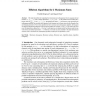Free Online Productivity Tools
i2Speak
i2Symbol
i2OCR
iTex2Img
iWeb2Print
iWeb2Shot
i2Type
iPdf2Split
iPdf2Merge
i2Bopomofo
i2Arabic
i2Style
i2Image
i2PDF
iLatex2Rtf
Sci2ools
105
click to vote
ALGORITHMICA
2006
2006
Efficient Algorithms for k Maximum Sums
We study the problem of computing the k maximum sum subsequences. Given a sequence of real numbers x1, x2, . . . , xn and an integer parameter k, 1 k 1 2 n(n - 1), the problem involves finding the k largest values of j =i x for 1 i j n. The problem for fixed k = 1, also known as the maximum sum subsequence problem, has received much attention in the literature and is linear-time solvable. Recently, Bae and Takaoka presented a (nk)-time algorithm for the k maximum sum subsequences problem. In this paper we design an efficient algorithm that solves the above problem in O(min{k +n log2 n, n k}) time in the worst case. Our algorithm is optimal for k = (n log2 n) and improves over the previously best known result for any
Related Content
| Added | 10 Dec 2010 |
| Updated | 10 Dec 2010 |
| Type | Journal |
| Year | 2006 |
| Where | ALGORITHMICA |
| Authors | Fredrik Bengtsson, Jingsen Chen |
Comments (0)

